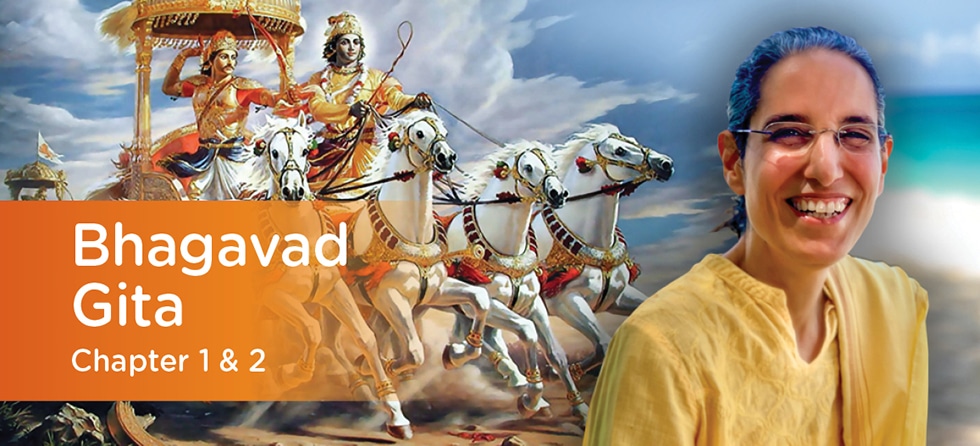- LIVE ONLINE PROGRAM
February 27 – March 7, 2021
Essential Message of the Bhagavad Gita: Teachings from Chapters 1 & 2
Jnaneshwari Chaitanya
2 WEEKENDS, Saturday & Sunday, February 27-28 and March 6-7, 11:30am-1:30pm EST
Course description:
The Bhagavad Gita is a dialog between Lord Krishna and Arjuna, which took place about 5,300 years ago on the battlefield of Kurukshetra. It is a universal gospel which appeals to all, irrespective of age, race, or religion. It has a universality which embraces every aspect of human action and which suits and elevates every stage of human development.
At times in our lives, we are all faced with choices and decisions that seem unmanageable and cause us to doubt what we are doing. Chapter one describes how in the middle of the battlefield, Arjuna, the great warrior, finds himself facing a heartbreaking decision. He realizes that he is about to engage in war with his own relatives and friends. Confusion and despondency reign in his mind. Should he participate in this terrible war? Is it proper to destroy one’s relatives for the sake of kingdom and some pleasures? Would it not be much better for him to surrender everything to his enemies and retire in peace? Arjuna expresses to Lord Krishna his wish to refrain from fighting. Confused and despaired, he sits down on the seat of his chariot.
In chapter two, with his heart filled with sorrow, Arjuna surrenders himself completely to the Lord, seeking His guidance to get over the conflict of his mind. Lord Krishna begins to teach Arjuna and reveals to him during the course of His teaching the most profound, sublime and soul-stirring spiritual truths.
This teaching was in fact given, through Arjuna, to all of us who like Arjuna, are struggling to be happy and to fully understand the purpose of our life and our own duty.
The battlefield of the Bhagavad Gita symbolizes the ongoing inner battle which every spiritual aspirant faces when trying to become a better person and to evolve on the spiritual path.
With patience and with clarity, Lord Krishna guides us into understanding what life is all about and who we truly are.
What you'll learn:
- The fascinating story behind the Bhagavad Gita scripture
- The purpose of the Bhagavad Gita and how it is relates to our life
- The two paths: action and wisdom
- Delusion and grief: cause and the remedy
- Dharma and Swadharma
- The law of Karma
- The four castes
- The four stages of life
- The eternity of the Soul and the Vedanta philosophy
- Selfless service: Karma yoga philosophy and its application
- Pairs of opposites and transcendence
This course is for:
- People who wish to have a clear and correct understanding of the Bhagavad Gita. It is suitable for people who have never studied the scripture before, as well as for people who are familiar with it
- Practitioners, teachers and students, who wish to obtain inspiration and make progress with their own practices
Course Schedule:
- Introduction to the Bhagavad Gita
- Introduction to chapter one
- The war is about to begin -what is happening on the battlefield?
- The reasoning of Arjuna and its outcome
- Arjuna’s plight
- The Guru
- Grief and delusion – how do they come about?
- What is duty, what is personal duty
- The eternity of the soul
- The consequences of abandoning duty; spiritual and worldly
- The pairs of opposites and the secret of work
- Introduction to karma yoga
- Pleasure and power – the goals of the unwise
- Evenness of mind
- Attachment and it’s outcome
- Arjuna’s path
- The marks of a person who has steady wisdom
- The attainment of full satisfaction
- The three afflictions
- Control of the senses
- The way to destruction
- The way to peace
Additional Information:
2 weekends, Saturday & Sunday, February 27-28 and March 6-7, 11:30am-1:30pm EST
This program is offered live through Zoom webinar with the availability for students to interact through Q&A with the presenter.
For enrolled students, a video recording will be available after each class in the event you miss a class or would like to review the content.
It is possible to register and take the course at any time. You can catch up on any classes you miss with the recordings.
Requirements and Recommendations:
- No experience necessary. This program is open to beginners as well as advanced practitioners.
- Viewing Device: Desktop or laptop computer will provide the best experience, although you can also connect via a tablet or smartphone.
- Internet connection: High-speed broadband wired or wireless is best.
- Video: Download Zoom to your computer, or install the Zoom app to your device. For interactive group sessions, a webcam or integrated camera will allow others to feel more connected with you.
- Audio: Headphone speakers are recommended. If you wish to participate vocally, a headset with a microphone will be ideal.
Course Includes:
- 8 hours of on-demand video
- The last fifteen minutes of each class will be dedicated to questions and answers on the topic studied.
- An introduction to the Bhagavad Gita
- An in-depth study of chapters one and two with the traditional commentary and teaching of Swami Sivananda.

Jnaneshwari Chaitanya
Jnaneshwari Chaitanya is a senior teacher of the Sivananda Yoga Vedanta Centers. She joined the Sivananda organization in 2001 and was initiated into Brahmacharya in 2016.
An experienced and devoted practitioner of Yoga, meditation and philosophical studies, she regularly teaches Yoga and Vedanta in the ashram programs and the Bhagavad Gita in Sivananda Yoga Teacher Training Courses. Jnaneshwari Chaitanya is known for her clear and pure way of communicating yogic knowledge and its application in daily life.
